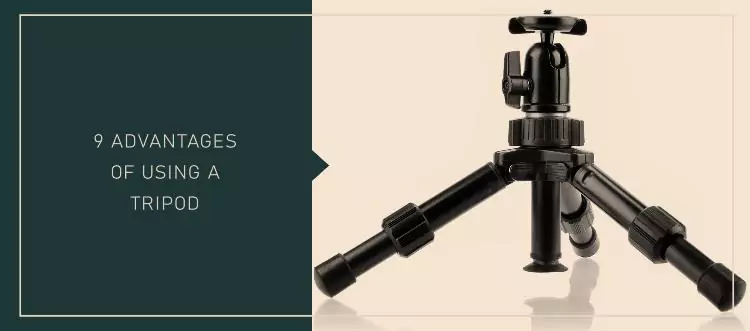Theodore Lowe, Ap #867-859
Sit Rd, Azusa New York
Find us here
9 Advantages of Using Tripod While Taking Photos: Boost Stability & Clarity!

The support that a tripod offers is essential, since it serves as a stabilizer with three legs to stabilize the camera. A tripod is a must-have accessory for taking amazing pictures.A tripod is essential whether taking pictures in low light, using long exposures, or trying to get clear photographs. You can improve your photography skills in the 9 ways listed below.
1. Increased Stability
For those looking to capture crisp, blur-free shots, tripods are a necessary accessory for photographers and videographers. Tripods eliminate camera shake considerably by offering a steady surface, particularly during long exposures or in low light. Smooth time-lapse videos, beautiful landscapes, and finely detailed images all depend on this stability.
2. Better Composition
A tripod isn't just a support system; it's a creative tool. By poviding a stable platform for your camera, a tripod allows you to take your time crafting the perfect composition. You can experiment with different angles, lines, and framing without worrying about camera shake. This freedom empowers you to create more intentional and visually appealing images, capturing the essence of your subject in a way that truly stands out.
3. Long Exposure Photography
Long exposures are a photographer's playground, allowing them to capture the world in a way that's both surreal and beautiful. But achieving these stunning effects requires a steady hand, and that's where tripods excel. When shooting star trails or light painting, a tripod ensures that your camera remains completely still, even as the shutter remains open for extended periods. This stability allows more light to enter the sensor, revealing the hidden movements of the night sky or the mesmerizing patterns created by artificial light. Tripods are essential tools for unlocking the full potential of long exposure photography.
4. Consistent Framing for Multiple Shots
One of the most significant advantages of using a tripod is its ability to maintain a consistent camera position. This is invaluable when taking multiple photos of the same scene, as it ensures that the images align perfectly. Whether you're creating panoramic vistas or stunning HDR composites, a tripod's stability is essential for seamlessly stitching the images together. By eliminating camera shake and maintaining consistent framing, tripods help you achieve professional-quality results that are visually stunning and visually coherent.
5. Great for Video Recording
In the world of videography, a tripod is more than just an accessory; it's a necessity. By providing a stable platform for your camera, a tripod eliminates the shaky footage that can distract viewers and detract from the overall quality of your videos. With a tripod, you can capture smooth, professional-looking footage that is easy on the eyes and engaging to watch. This stability also makes it much easier to follow moving subjects without introducing unwanted camera movement, ensuring that your videos are both visually appealing and informative.
6. Helps with Low Light Situation
When shooting in low-light conditions, longer shutter speeds are often required to capture enough light. However, holding a camera by hand during these times can introduce significant blur, even with the best intentions. A tripod, on the other hand, provides a stable foundation that effectively eliminates camera shake, allowing you to use slower shutter speeds without compromising image quality. This means you can capture stunning low-light photos without relying on flash, which can often create harsh shadows and unnatural lighting. By using a tripod, you can achieve a more natural and atmospheric look in your low-light photography.
7. Macro Photography
Macro photography requires a level of precision that can be challenging to achieve without the aid of a tripod. When capturing tiny details, even the slightest movement of your camera can throw off your focus and result in blurry images. A tripod, on the other hand, provides a stable platform that ensures your camera remains perfectly still throughout the entire exposure. This stability is crucial for achieving sharp, crystal-clear images of even the smallest subjects, allowing you to capture intricate details and textures that would otherwise be lost.
8. Reduces Fatigue
Holding a camera for extended periods can be physically demanding, especially when shooting with heavy lenses or telephoto optics. A tripod not only provides a stable platform for your camera but also relieves the strain on your arms and shoulders. By taking the weight of your equipment, a tripod allows you to focus on framing your shot and experimenting with different compositions without worrying about fatigue. This ergonomic advantage is particularly beneficial for those who enjoy long photography sessions or who are prone to discomfort from holding a camera for extended periods.
9. Use of Heavy Equipment
Many modern cameras and lenses are quite heavy, making it challenging to hold them steady for extended periods, especially when shooting handheld. This can significantly impact image quality, as camera shake can blur details and reduce sharpness. A tripod, however, can easily handle the weight of even the heaviest equipment, providing a stable platform that allows you to use high-quality lenses without compromising on image quality. This is particularly important for photographers who prioritize sharpness, detail, and overall image quality in their work.
Conclusion
In summary, tripods are a valuable tool for photographers. They provide stability and can greatly improve image quality. They make certain photography styles possible. They also help reduce physical strain. Whether you're a professional or a hobbyist, a tripod can enhance your photography experience. Consider adding one to your gear. Your photos will thank you!
Related blog posts
QR Codes in Photography: Unlocking Creative Possibilities
Imagine transforming your photography into an interactive experience that captivates your audience. QR codes are revolutionizing the way we share and engage with images.


